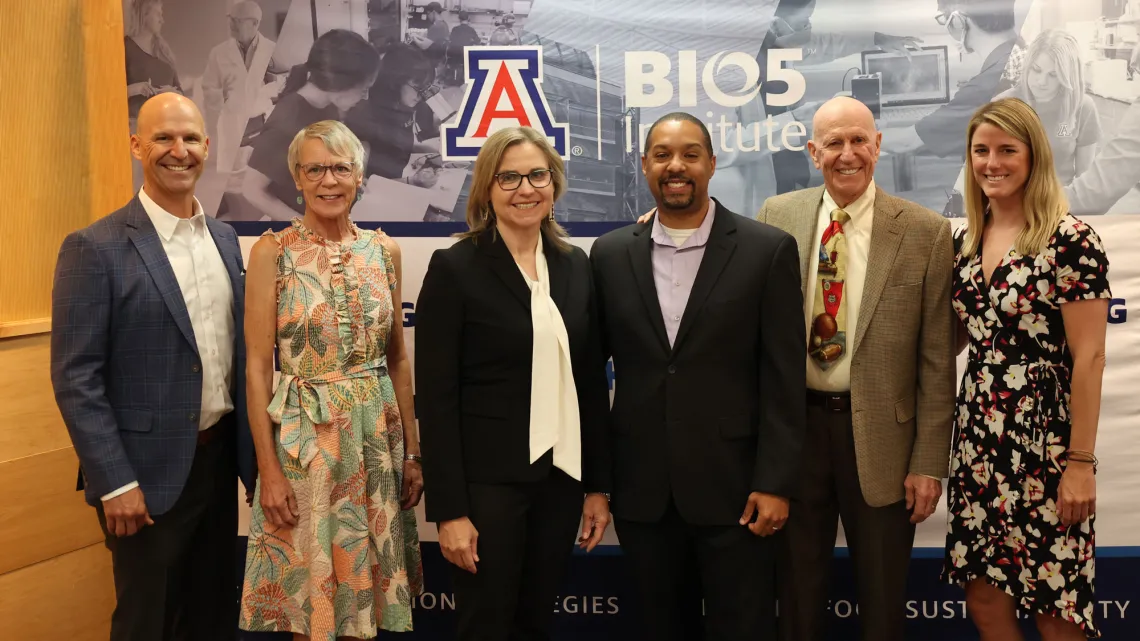Michael D.L. Johnson named inaugural Keating Family BIO5 Professor
The new distinguished professorship recognizes a BIO5 member with interdisciplinary research excellence and a commitment to mentorship.

Michael D. L. Johnson, associate professor in the Department of Immunobiology at the University of Arizona College of Medicine – Tucson, is the inaugural Keating Family Endowed Professor for Interdisciplinary Research at the BIO5 Institute.
“I’m honored to be recognized with this level of support from the Keating Family BIO5 Professorship.” said Johnson, a member of the BIO5 Institute. “It’s exciting to have the BIO5 Institute invest in projects that reinforce my efforts to be a good steward of science, both in and outside of the laboratory. This acknowledgement gives me the confidence and opportunity to continually build on my research and outreach ideas.”
Created by BIO5 Institute director Jennifer Kehlet Barton and made possible by the Thomas W. Keating family, this award is given to a BIO5 member who exemplifies the characteristics of interdisciplinary biosciences research excellence, collegiality, spirit of mentorship and engagement, and strong communication skills.
“Michael Johnson was an obvious choice to be the inaugural recipient. His interdisciplinary research is outstanding, and his impact goes even further,” said Barton. “He cares deeply for his lab, university and scientific community and has nurtured multiple programs to assure the opportunities and benefits of bioscience are available to all. He has an infectious optimism that inspires us to do better and be better.”
A deserving recipient in research and mentorship
Johnson leads an interdisciplinary research lab that highly values training and outreach at all levels, from aspiring college students to postdoctoral researchers. Alongside his research and training programs, he accepted the position of associate dean for basic science research and graduate studies at the UArizona College of Medicine — Tucson in August 2023.
The Johnson lab studies Streptococcus pneumoniae — the bacteria responsible for pneumonia — and copper toxicity.
As living organisms, bacteria need nutrients and metals when they infect a human host. However, too much metal such as copper can harm bacteria. By investigating why copper is toxic to bacteria and how bacteria interact with metals during infections, the Johnson lab works toward developing novel therapeutic strategies against deadly bacterial infections.
Weaponizing copper against bacteria is especially critical as the misuse of antimicrobials creates drug-resistant pathogens. For example, a FY23 BIO5 Rapid Grant is helping Johnson and his collaborators develop a chemical compound with copper that could act as an antimicrobial agent.
Along with his research, Johnson has developed various workforce development programs while at the University of Arizona. Two notable examples are the National Undergraduate Research Project (NSURP) and the BIO5 Postdoctoral Fellowship.
In the midst of the pandemic, Johnson and David Baltrus, associate professor in the School of Plant Sciences in the College of Agriculture, Life and Environmental Sciences and BIO5 member, built a summer research program that became the largest program of its kind to provide remote microbiology internships for underrepresented students with support from Jennifer Gardy at the Bill and Melinda Gates Foundation.
The National Summer Undergraduate Research Project (NSURP) completed its fourth summer in 2023 of virtually matching undergraduate students with mentors around the world. With around 400 students supported through the program and upwards of 250 mentors, Johnson is thrilled to see the program continue to grow.
“This program is not only developing research skills but changing science communication,” said Johnson. “These interns are working on real-world projects at their kitchen table and fostering scientific discussion with their friends and family.”
Johnson also saw a need to support researchers further in their scientific journey. In collaboration with the BIO5 Institute leadership and staff, he developed the BIO5 Postdoctoral Fellowship to better support outstanding early career researchers in 2019.
Meant as a launchpad, the fellowship provides financial support and mentorship to postdoctoral fellows in the labs of BIO5 members. The year-long experience helps postdoctoral researchers learn the intricacies of grant and funding mechanisms to better ensure their long-term success.
“We need to make sure that we support people from one step to the next in their scientific careers,” said Johnson. “To stay innovative, we need diverse mindsets and perspectives working on projects.”
First BIO5 distinguished professorship
Establishing a distinguished professorship at the BIO5 Institute has long been a goal for Barton as a way of recognizing extraordinary faculty. With more than 350 BIO5 members across a wide variety of colleges at the U of A, these researchers work together to advance the pace of scientific discovery while developing and commercializing new devices, diagnostics, and treatments.
Beyond their research, BIO5 members embody the ability to communicate the positive impact of their work to the community, government, industry, students, and fellow researchers.
Barton wanted to formally recognize and support a BIO5 member who best exemplifies these values every day, while also recognizing the transformative contributions of Thomas Keating and his family.
Awarded for a one-year period starting July 1, 2023, the professorship is renewable for an additional one-year period upon review by the BIO5 Institute director. As a rotating professorship, future awardees will be chosen through a nomination and committee process. Associated funds can be used for exploring new research areas, purchasing equipment, and supporting students.
“I’m not worried that I’ll run out of ideas, but I need the people to help me execute them,” said Johnson. He's excited to use the distinguished professorship to support his current program and students, and perhaps get some new ideas off the ground.
